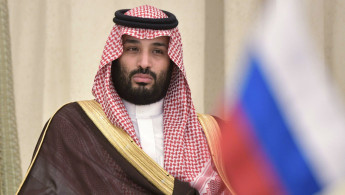Russian 'propaganda vehicle' opens offices in Saudi Arabia
Saudi Media Minister Turki Al-Shabanah signed the memorandum with Dmitry Kiselyov, head of Rossiya Segodnya, on the sidelines of Russian President Vladimir Putin's state visit to the country.
Sputnik was launched by Rossiya Segodnya in 2014.
The agreement will see projects implemented to develop "objective and professional" media coverage of politics, economics and social and cultural issues, Saudi media reported.
It will also help deepen Saudi-Russian bilateral ties, press reports said.
Kiselyov, appointed to head Rossiya Segodnya in 2014, is considered one of the Kremlin's main propagandists and is a key part of Putin's media operations.
He hosts a weekly TV show and is well-known for his anti-Western diatribes and tirades against the LGBTQ+ community.
"We are so pleased and happy to have an office here for Rossiya Segodnya (Russia Today). We are pleased that Riyadh will be the source of your news. We are pleased to have your first-hand witness to see Saudi Arabia as it is, not through somebody else's eyes", al-Shabanah said, according to Sputnik.
Read more: Russia's Putin on first visit to Saudi Arabia in over a decade
Putin arrived in Saudi Arabia on Monday on his first visit to the country in over a decade, with the two countries signing some 20 agreements and contracts worth billions of dollars on aerospace, culture, health, advanced technology and agriculture.
The announcement of the Russian-Saudi media cooperation deal follows a host of similar joint agreements promoted by Russian state outlets in other countries.
Earlier this week it was announced that Russian state broadcaster RT will begin training journalists from state media companies in the Philippines, including PTV 4 and the Philippine News Agency.
The training will include content verification, production, and promotion.
The agreement was originally part of a 2017 accord with Russia's ministry of telecom and mass communications.
Earlier in October, the directors of North Korea's Korean Central News Agency and TASS news agency signed a cooperation agreement to counter "fake news".
The agreement came during a visit to Pyongyang by a Russian delegation, including the head of Channel One state television.
Last week, a US Senate Intelligence Committee report concluded that RT uses YouTube as its "propaganda vehicle of choice."
Earlier this year, King's College of London's The Policy Institute published a report which detailed how Russian broadcaster RT and Sputnik "perform a 'damage control' function for the Russian state" to counter unflattering news incidents.





 Follow the Middle East's top stories in English at The New Arab on Google News
Follow the Middle East's top stories in English at The New Arab on Google News


